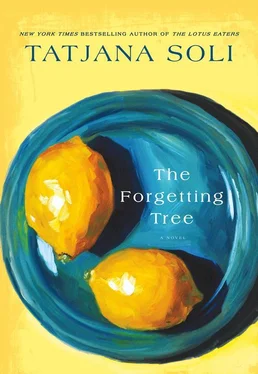One day that was especially fine — the sun hot but the trade winds carrying off the humidity, Marie walked to the public fountain to wash her dress while she wore the other one she owned. A customer from the night before had given her a generous tip, and she treated herself to fritay, fried pork in dough. Out of the corner of her eye, she saw a swaggering, loose-jointed walk and dreads that could belong only to one man. “Jean-Alexi?”
The young man turned and studied her with a smile, trying to place her. “Bonjou.”
“Don’t you know me? From the village?”
He shrugged, lifted thin, muscled shoulders. “ Koumon ou rele? What’s your name?”
“Marie. From the village.” Their brief meeting had been years ago; they had never exchanged names. News of Jean-Alexi had created a relationship in her mind. “You protected my money from some boys on the beach.”
“Good for me, nuh ? I’m late now.” He didn’t remember her, but as he turned away, she became desperate to hold on to someone from the old days.
“I’m Leta’s girl.”
His face broke open in recognition. “Why didn’t you say? Say hello now to Maman .”
“They killed her.”
He nodded as if this were part of the everyday, no who? or why? needed. “ Mwen regret sa. I’m sorry.”
“I have no one to tell,” she said.
“Grown up as pretty as your maman .” He looked at her closely, then looked away as her tears began to fall. Only in front of someone who understood did she feel free to cry. “Let’s go.”
* * *
They walked out of La Saline and through downtown, grabbing rides from trucks and cars whose drivers beeped in recognition of Jean-Alexi. Inside the vehicles, the men sat in front and discussed business, ignoring Marie in the back, which was just fine with her. This was her first chance to see the city as a whole, and as their journey slowly led them up the hill, the details that were so hard to bear up close grew smaller and smaller. From a distance, the brightly painted shantytowns almost looked tolerable next to the rolling blue of the ocean.
Halfway up the hill, Jean-Alexi jumped out of the pickup they were riding. Marie had not imagined an area as nice as the one they now found themselves in. Palm trees swayed overhead, bougainvillea and hibiscus formed crowded hedges at street level. Although the houses were run-down, many abandoned, there was a sense of ease that didn’t exist down below. Jean-Alexi led her inside the crumbling walls of a compound.
“These were your people. Look how we sliding back in one generation — you turned bouzin .”
The main house had been condemned — a fire and then a few years later an earthquake made it unsound — but on the grounds, families had set up shacks, squatters’ residency.
“I like it here,” Marie said.
“You should. This is your papa’s house. Or was, long ago.”
“Did you know him?”
“I was just a kid. But he was a great man. Gave people hope.”
They walked through the empty rooms, looted of everything of conceivable value. In the kitchen, the stove gone and a pile of coals on the floor. In the bedroom, an old stained mattress. Marie liked it that way — the place hollowed out of meaning. Too painful to consider what could have been her life.
“I come here sometime to be alone. Now you should come. This is all that’s left you. Your maman was a good woman. Like tante to me.”
Marie stood at the open window, stripped long ago of shutters, glass, and screens. The only thing that couldn’t be stolen was the view of the glittering ocean far below.
“Is this rich neighborhood?”
“Ah, non . You go on up to Pétionville for that. You headin’ up in the world, you go there and then next stop Miami.”
“Miami.” The name rolled in her mouth like something sweet and undreamed of.
“Hurry goin’, girl. This La Saline life goin’ eat you up fast.”
He rummaged in a corner and came back with a bottle of tafia, homemade rum. As the sun sank into the ocean, they sat side by side on the mattress and passed the bottle.
“How about I stay here with you?” Marie said. “Not go back to La Saline. Nothing for me back there.”
“ Mwen leaving tomorrow, next day. Big time waitin’ for me in Miami.”
Marie nodded at the fact that Jean-Alexi would always be just ahead, out of her grasp.
“You ever hear ’bout the chimère in Cité Soleil?”
Marie shook her head.
“Don’t want to. Just means I have a mark ’bove my head same as your papa and maman . Time to be moving on.”
“I get so scared,” she whispered.
He nodded. “When I used to get scared, I killed it right away. Kill it, that’s all I can tell.”
Halfway through the bottle, she realized she was drunk for the first time in her life, and the worry that was a constant in the pit of her stomach was gone, or at least unfelt.
“You can kiss me,” she said.
He shook his head. “You like mwen sè, sister.”
Jean-Alexi rolled over and fell asleep. She had wanted his kiss. The chance to feel desire herself was new, instead of serving as the object of it for others. Love, too, as impossible and out of reach as a big house on a hill.
Loud chirping woke them the next morning. They searched the empty room until Jean-Alexi found a cricket high up in the rafters. Carefully he cupped it in his palms, carried it over to the window, and opened his hands. It just sat there, big and brown, warming in the sunbeam it found itself in. It started to rub its wings and sing again. “Get goin’. Don’t know a good thing when it happens.” He blew on it and the insect flew straight up and out into the sky.

Jean-Alexi didn’t leave but neither did he touch her. She wanted to be touched by someone she chose. Nothing more than that. Too much. Instead they lived chastely side by side in the abandoned house for a couple of days. It was the happiest time of Marie’s life. One night after he took her out for a big dinner at a friend’s restaurant, they lay in bed and held hands.
“That day on the beach I told you about?” she said.
“Listening.”
“You were so beautiful that day. I wanted you for mwen boyfriend, but you don’t even look.”
Jean-Alexi smiled and closed his eyes. “You were just a girl-child, I think.”
He leaned over to kiss her, then kissed her more. “I’m leaving here,” he said.
“It’s okay,” she said, and covered his mouth with hers. She made love to a man of her choosing. This is it, she thought, this is what it should be. The other times were such a sad fake. Women did it to eat, but why did the men buy? Compared to the real, it was worse than nothing.
After a time, the moon drifted up, and she was so peaceful in the quiet room, she fell asleep. In the morning, she woke up, and Jean-Alexi was gone.
* * *
After Jean-Alexi left, something hardened inside Marie. She went to a higher-class madam who paid off Madame Zo, and soon she was walking the fancy streets of Pétionville. Jean-Alexi’s prophecy haunted her — she wasn’t going to let the life eat her up. She saved to buy one expensive outfit, and once well-dressed, she worked her way into the restaurants. She would sit alone and order dinner and hardly ever was she alone by the time she finished, check taken care of.
A French aid worker took a fancy to her after several times together and made a deal to have her to himself when he was in town. He was an older, important man in local politics; she heard him give interviews on the radio, speaking of aid and saving the Haitian people. Although he did not care enough to keep Marie his when he was gone, he insisted on owning her body when he was there.
Читать дальше













